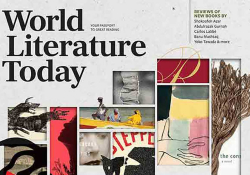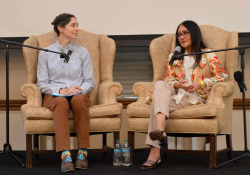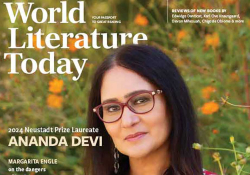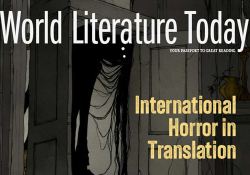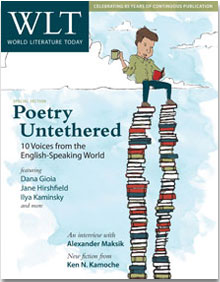EDITOR'S NOTE, September 2011
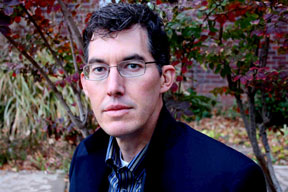
The ten contributors to this issue's special section on English-language poetry represent some of the many transmigrations of English, from Britain herself to various far-flung outposts of exploration and empire, including Canada, India, Kenya, New Zealand, South Africa, and the United States. Two of the poets (one Greek, the other Ukrainian), while not native speakers, adopted English as their literary language after immigrating to the United States. A common motif voiced by the poets featured here is a sense of being untethered to geography, unfettered by temporal constraints. The speaker in Maya Khosla's "Dispersal" feels propelled to "snap ties with known terrains" and "venture across landscapes never traversed" (page 43). The body alone is not the only thing freed from constraint, however. Poets often disrobe language itself in their work, stripping away veneers of cliché and convention to reveal the naked word on the page. A sense of cognitive vertigo is also evident; the French call it dépaysement, the bewildered feeling one gets when familiar landmarks—those compass points of identity—have disappeared. "Migration, too / is the mind in storm," Khosla writes.
In addition to casting off their mental or geographical fetters—or what Blake once called our "mind-forg'd manacles"—several of the poets in this issue share an emphasis on the poetic voice, especially the vernacular sounds and rhythms of everyday speech. Jane Hirshfield, in her essay on modern U.S. poetry (page 45), focuses on voice as a common thread linking American poets over the past century and a half: "A voice in the ordinary meaning of that word has a geographical accent, a family accent, it speaks in the language it was raised in or in one it has learned, and it is the sounding board of the body, identifiable as one person's voice, and no other. The same is true of voice in a poem, and of the voice of a poetic tradition. These are fingerprints made more visible, because dipped in deliberate ink." Dana Gioia also speaks of "the powerful enchantments of meter, rhyme, and narrative" in his compelling interview with Michelle Johnson (page 27). These poets stake their claim decidedly in favor of the art and craft of poetry in a world persistently fraught with national, linguistic, and political divisions. Yet even as they linger over formal concerns, they are ever mindful of the broader social and historical moment in which they write, ten years after 9/11.
At the end of South African–born poet John Mateer's "Mall of the Emirates" (page 24), he speculates:
That's probably how we ended up here
in this extravaganza of shops, this oasis,
as a poem born on the tip of another's tongue,
as perfectly translatable synonyms for that
word: "exile."
Here, Mateer's speaker unites both concerns—an emphasis on the poetic voice ("born on the tip of another's tongue") as well as that loosening of geographical constraints which is the hallmark of our globalizing era. Nicholas Samaras likewise finds himself "loose on the world for want / of a country" (page 39). In the end, voice and language may be the most reliable ballast, as the ground on which our poets stand alternately proves unstable or recedes from view. Untethered? Yes, but the horizon of black lines on the white page—with their Penelope-like return to the left-hand margin after every line break—anchors these poems, keeping them in the mind's eye, and ear, even as they tempt us with arcs of transcendence.
Editorial note: Due out in September from the University of Iowa Press, A Broken Thing: Poets on the Line, edited by Emily Rosko and Anton Vander Zee, contains fascinating essays on how poets use lines on the page as a structure or scaffolding for their work. In her essay "The Free-Verse Line," Shara McCallum writes: "I'm interested in how the line in free verse, chafing against or in concert with the sentence, creates a rhythm that corresponds to the inflections of an actual, human voice."
